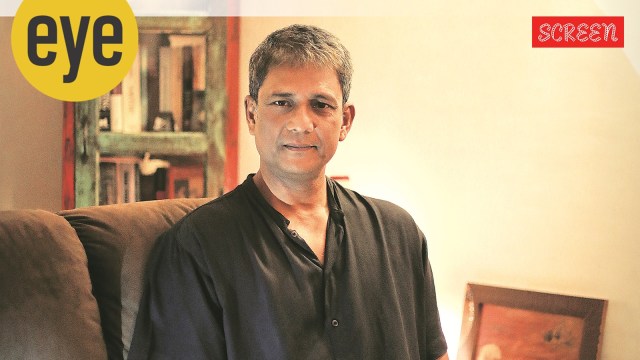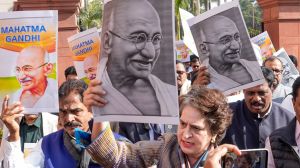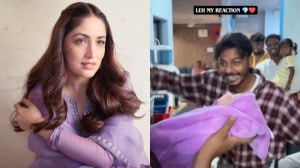Adil Hussain: ‘Most stories on OTT platforms are dark. I hope that changes’
Actor Adil Hussain speaks to Shubhra Gupta on cinema in a pre-digital world, democratisation of filmmaking and why this is the best time for actors
 Actor Adil Hussain. (Express Photo by Abhinav Saha)
Actor Adil Hussain. (Express Photo by Abhinav Saha)I thought we could speak to you a little bit about being a denizen of a world which was pre-digital. As a person who remembers a world that used to be pre-digital, what does it feel like?
There are many experiences I grew up with. I was probably in Class VI and every Friday, I would bunk school, buy an 85-paisa ticket to sit in the front row and watch Bachchan sahab, Dharmendra sahab, Randhir Kapoor and Hema Malini on screen. I would dream that I too would dance around trees when I grew up. My brother would discover me, grab me by my ear in the middle of the film and take me home and then I’d get a few slaps from my father. But today, you have access in your palm and you can watch whenever you want. It’s a huge jump, I don’t know how to qualify or quantify the experiential difference. Now I can choose the time and space where I will watch it — on a flight, at a party, or on a big screen with a projector. This kind of intimacy has its own charm. On the other hand is the communal experience of going to a cinema hall and meeting people. Probably you would use that event to dress up well. I would value the communal experience more. I miss that quite a lot nowadays.
A filmmaker like Christopher Nolan, for example, is known for shooting on film. He says celluloid has the kind of depth that digital will never have. But there is also a democratic aspect when, for example, an iPhone can be used to shoot an entire film — Steven Soderbergh and a couple of other people have used their phone cameras to shoot films, which means that you don’t really use expensive film, you’re using a digital device. How do you see that?
I have limited exposure to the technical aspects of filmmaking. But Nolan and others who prefer to shoot on celluloid have their reasons which I will not be able to decipher with my unqualified eyes. But the democracy part is that during the celluloid time, you had to have a huge amount of resources to make a film. But when you have this camera in your palm, anybody can make a film. The danger of that is that a lot of trash and mediocrity is thriving in the digital world. But since it has democratised (filmmaking), talented, gifted people in villages and semi-urban places like Gaolapara (Assam) where I come from and where newspapers used to reach three days after they were published, can make a film and the world can access it. It has its downsides and upsides as well.
I am an optimistic person, so I feel people who are curious to access quality content would be able to find it floating in digital spaces if they looked for it. But it is also important that you look for it.
You once said your film Mukti Bhawan (2017) was a transformative experience for you. Can you talk a bit about that?
It’s a beautiful film about a father and son. It’s a funny, witty, deep, heartwarming and heartbreaking film. All their unspoken accusations and grudges against each other they thrash out within the confines of a tiny hotel room before he passes. My father died in 2003 at the age of 93 and before he died, I had the opportunity to read a lot about death. I read Sri Aurobindo’s books on death and questions written by his disciples or asked by his disciples on death and exactly what happens after one dies. The book is called Letters on Yoga. The answers were so profound, this was the best story I have heard and stories are very important.
With the coming of OTT platforms, the world has opened up as far as filmmaking is concerned. How is it for an actor like you?
This is the beginning of the golden era of actors. (For) those who do not believe in becoming a star but those who believe in the craft of acting. This time has just started and we have a long way to go in this particular journey of celebrating the nuances of the craft, the deeper journey into the nuances of human conditions and embodying a role which would give a very vivid experience and evoke deep empathy amongst the audience. This particular exercise of empathising would probably lead to appreciating the other instead of being scared of the other, which is constantly being used by our politicians and corporations.
I am currently working on two Netflix projects, a series and a film. I’m going to start shooting for another independent project. All of these will be on OTT platforms… So I am grateful to them. But they must do more. I think OTT platforms probably should have their commercial aspects where they have to get their TRPs and subscribers, otherwise they can’t run the channel unless they show some profit to the shareholders. They also have a responsibility of bringing in quality products. Close to 80 per cent stories on OTT platforms are about the darkness, the lower depth of humanity. I hope that changes and we get to see something which is uplifting and lightens your being and is entertaining at the same time.
You need to have the intention and your craft. At the same time, don’t try to bypass the hard work to make something uplifting yet entertaining… I think there is a lack of courage to take the risk. The audience has been fed certain kinds of films and entertainment content for the last 30-40 years. One has to entice and invite the audience to participate. It must find its way through the heart into your mind to be curious.
Filmmakers and the people who fund the films have to evolve a little more to trust themselves a little more and to find, not the shortcut, but put in the harder work into making something which is long-lasting, which will last for centuries rather than something which comes on a Friday and goes out on another Friday.
- 01
- 02
- 03
- 04
- 05






























